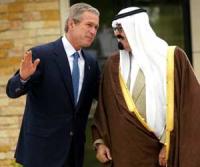To many, the Bush Administration has been scrambling to appear more sensitive lately to perceptions the U.S. government either doesn’t take global warming seriously — or doesn’t take it seriously enough.
During the current U.S.-sponsored conference on climate change, for example, the president urged the world’s worst polluters, including the United States, to set goals for curbing emissions. He also proposed creation of an international fund to finance research into clean-energy technology.
The conference was attended by 16 countries responsible for more than 80 per cent of global carbon emissions. Officials from Australia, Britain, Brazil, Canada, China, France, Germany, India, Indonesia, Italy, Japan, South Korea, Mexico, Russia and South Africa were attending, as well as European Union and UN climate-change officials.
Rather than seize the opportunity by calling for binding controls, Bush suggested each nation should decide for itself how far it wanted to go – without stunting economic growth, of course.
In a last-gasp effort at damage control, the White House circulated a pocket-size handbook aimed at dispelling various “myths” about U.S. environmental policy. But trying to dispel widely held notions is a far cry from taking action on global warming.
The U.S. alone spews up to one-quarter of the world’s total annual output of carbon emissions. China is the world’s largest nation in terms of both population and pollution. India is set to overtake China. Both were on hand when Bush took the podium to reiterate his tiresome call for voluntary action.
Another opportunity lost to histrionics and political posturing.
Subscribe to our newsletter
Stay up to date with DeSmog news and alerts






